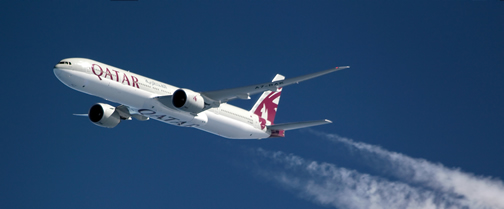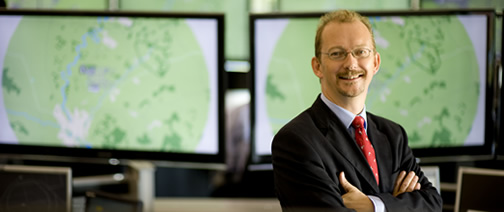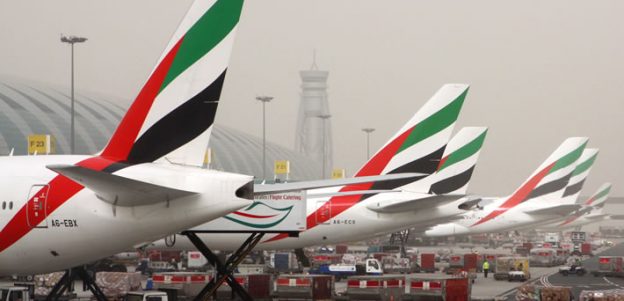Time to secure the Gulf’s aviation future
7 April 2014Tomorrow I will be attending the Global Aerospace Summit in Abu Dhabi. One of the topics on everyone’s lips will be how to unpick the Gordian knot of airspace capacity and congestion in the Gulf.
The future of aviation in the region is potentially one of the most exciting anywhere in the world, with the region having seen exceptional growth in recent years. Yet despite the enormous expansion and investment, despite the gleaming new airports and despite the record breaking aircraft orders, the security of that future remains in the balance.
The region stands at a cross roads between being one of the world’s true aviation powerhouses, or a land of missed opportunities. Which direction it takes hinges on it gaining mastery of the invisible infrastructure – the mastery of airspace. The simple truth is that any airport, no matter how many terminals or runways it has, will only ever be as efficient as the airspace that serves it.
And airspace in the Gulf is currently far from efficient. It is fragmented and hugely congested – a relic of quieter skies. If that situation remains unchanged the industry will never be able to fulfil its full potential, leaving both airport and airline investors increasingly frustrated and short changed. Delays will begin to spiral, connectivity will disintegrate and the region’s ability to act as an aviation hub will be critically undermined.
Airspace must be considered as an economic asset and just like any other asset it needs to be managed and curated. It is a problem that will only get worse as the region gets busier. The Gulf Cooperation Council expects aircraft movements in the UAE’s skies to almost double by 2030 to 1.62 million, with Al Maktoum International Airport destined to eventually become the world’s largest with an annual passenger capacity of 160 million.
So the problem is pressing, but what then is the solution? When Europe faced a similar conundrum, its nations agreed to set their differences aside for the common good and create a single organisation to aid the smooth flow of air traffic through the continent, with the UK as a founding member. That organisation was Eurocontrol and ever since it has worked with Europe’s national air traffic service providers to plan and coordinate air traffic flows through what is some of the world’s busiest and more complex airspace.
This is not to say Europe’s position is perfect. It isn’t. Our own airspace remains a patchwork largely designed around national borders, but change is coming and NATS is leading the charge for a more open and liberalised industry. In the UK we already have an agreement with our Irish counterparts to run airspace based on operational need as opposed to national boundaries, while we also work hand in glove with our military colleagues to make use of their airspace whenever possible. This then frees up capacity and allows us to offer more direct routes for our customers, the airlines.
The Gulf is at the very beginning of trying to address these problems and while it seems the entire region knows that its own version of Eurocontrol is what’s needed, progress to this point has been painfully slow. In January, Qatar Airways Chief Executive, Akber Al Baker publically recognised the risk airspace congestion poses to his business and the rest of the industry, not to mention to the UAE as a whole where aviation will account for a quarter of total GDP by 2016. “There will be a time, in our joint opinion, that there will have to be a single air traffic management system similar to Eurocontrol to monitor and operate a very congested airspace,” he said. Tim Clark, President of Emirates put the case simply when he said: “Airspace in this region will have to be dealt with.”
If the whole region knows that a ’Gulfcontrol’ is the required medicine, why then has the doctor not yet prescribed it? The answer, as ever lies in politics. Working groups have been set up in the past to study the issue, but progress has been very limited. The problem spans government departments and crosses national borders, where the prospect of ceding any kind of airspace autonomy is unpalatable. The problem is further compounded by the fact the Gulf states are surrounded by countries with highly restricted airspace, which in effect creates a bottleneck in the skies.
A single air traffic coordinator working with the airport operators and airlines would create enormous efficiencies, saving fuel and carbon emissions while generating capacity and reducing delays. It would secure the Gulf’s position as one of the major players in world aviation. Building a political consensus to reach that point has been next to impossible to date, but the growing business imperatives may help move things forward, with the risk of doing nothing now too great to ignore. I believe a solution can be found, but it will require a commitment from all parties to set aside vested interests.
The prize is great if the political will can be found to grasp it and I’m looking forward to the debate in Abu Dhabi.
Comments
Please respect our commenting policy and guidelines when posting on this website.






08.04.2014
06:44
Andrew Shand
I am at the airbus ProSky symposium today in Abu Dhabi which has about 250 delegates from airlines, ATC and manufacturing. To set the scene for the symposium, the challenge is clearly stated below.
By 2032 expect today’s travelling public to rise from today’s 2bn pax to 5bn due to growth in Middle class. Traffic globally is doubling every 15 years. Asia pacific 5% per annum growth and Middle East is the highest at 7% and by comparison Europe is projected to be 3.8%. Latin America 6%.
By 2032 there will be more than 230 cities with greater than 1m passengers per annum versus today’s 100. Aviation represents $2 trillion global economic impact and 3.5% of global GDP and 56 million jobs. Today there are 35000 city pairs served.
This means that aviation should thrive but the challenge is delivering airspace and runway capacity to match that growth hence the ATM system requires modernisation. The key to solving this is cooperation between air and ground. Growing capacity is a real challenge with growth of 5% per annum but the solutions exist and need to be deployed quickly.
On that note, today NATS and Airbus ProSky will announce signing a memorandum of understanding to work together globally to deliver many of those solutions.
I look forward to an interesting symposium.
09.04.2014
10:44
Frank Feeney
Richard is absolutely correct, in an industry with average operating margins of less than 8% wasting time, fuel and operational resources makes no sense.
As a long time IRL/UK ATC system user (pilot) I can remember operating Dublin-Heathrow flights in the late 80’s where slot delays of two to three hours were normal. When your flying double flights between our capital cities with the daily flight time of approx four hours and thirty minutes this meant a ’normal’ working day of 12 to 16 hours.
Poor productivity, wasted resources and more importantly poorly served airline customers.
Irish creativity came up with some ingenious ways to work around this problem like calling for startup whilst airborne inbound to Heathrow in the Bovington hold to beat the departure slot delay. This only worked for a few days until Heathrow ATC asked us for our current parking position, whilst we were still airborne. Funny but true.
Thankfully today, creativity in beating a poor system has transferred into European wide ATC creativity in unbinding National airspace whilst still maintaining National sovereign control, the integration into workable chunks has been beneficial for all European nations.
Its not perfect and never will be but untying the knot makes a lot of sense for a region known for its hospitality, service excellence and customer service.
Keep up the great work NATS, from a very happy customer.
Frank.
06.07.2014
16:35
Amirhossein Shojaeifard
The correct name is Persian gulf not Arabian gulf, not gulf. for more info please refer to: http://en.wikipedia.org/wiki/Persian_Gulf_naming_dispute
30.12.2014
15:12
Latyfa
((Amirhossein Shojaeifard )) it is ARABIAN GULF not Persian if you don’t like then go and live in IRAN